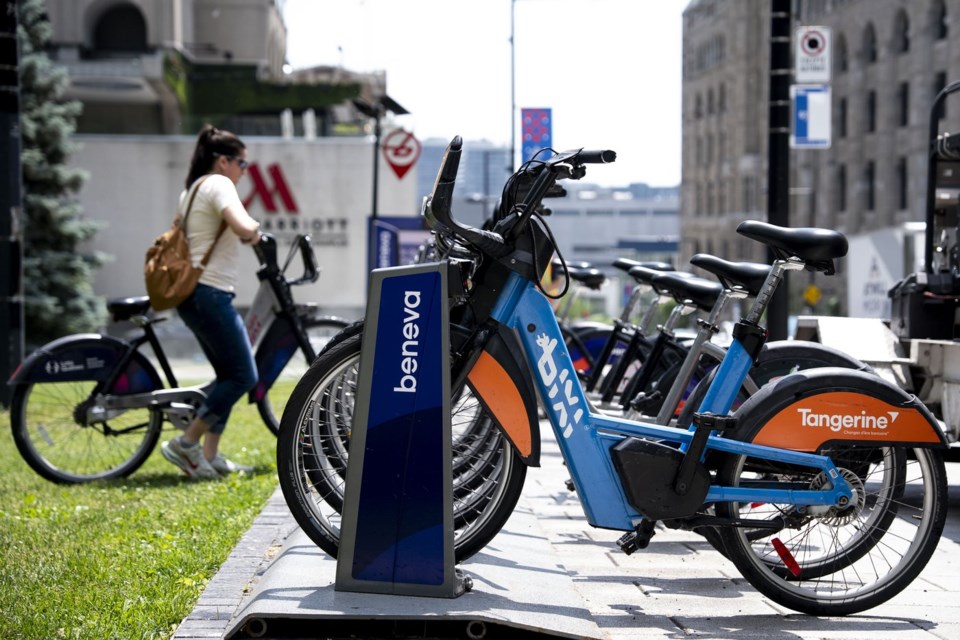MONTREAL — Montreal's main bicycle rental company says its users smashed records during the recent public transit strike, travelling the equivalent of more than 50 times around the Earth.
BIXI Montreal, which rents bikes for short rides, says its users made more than 80,000 trips a day during seven of the nine strike days, including more than 98,500 trips on June 11. Each of those seven days surpassed the busiest day in 2024, when 79,868 trips was a record at the time.
Pierre-Luc Marier, spokesman for the non-profit, says the company's bicycles made about 10,000 trips per hour during rush hour on the busiest days.
"It was three rentals per second across the entire network, so it was very, very popular, with a lot of frequency," he said in a phone interview on Wednesday.
In total, he said nearly 700,000 trips were made during the public transit strike, covering about 2,200,000 kilometres, "which represents 54 times around the Earth."
The strike by 2,400 transit maintenance workers reduced bus and metro service between June 9 and June 17, with full service on the weekend for the Canadian Grand Prix. Service was most limited during the first three days, when the buses and subways didn't run outside morning and afternoon rush hours and late at night.
Marier said the company added staff and capacity at docking stations to help ensure renters found a steady supply of bicycles and places to park them. Those staff included "valets" to smooth the bike-return process by accepting bicycles when docking stations were full.
Stations in residential neighbourhoods tend to empty out quickly in the morning as workers head downtown, where docking stations fill up. That pattern is reversed later in the day.
Marier said the company had all of its trucks on the road, and even rented extra, to help redistribute the bicycles and ensure an even supply. He said the company uses machine learning, a form of artificial intelligence, to predict the demand at each station.
He's optimistic that many of the people who tried the service for the first time during the strike will embrace cycling — and BIXI — on a longer-term basis. The company surveyed new users, and found that 86 per cent of those who tried the service for the first time intended to use it again.
"It's very encouraging for active mobility in general, not only BIXI but for cycling," he said.
Beyond BIXI, there were also "unprecedented" numbers of bicycles recorded during the strike by automatic bike-counting machines installed around the city, according to Eco-Counter, which operates some 50 devices.
David Beitel, who leads Eco-Counter's data services team, said the two busiest counters on the city's express bicycle network both reported their highest weekly totals for the week beginning June 9. Both clocked more than 14,000 trips on June 11 — a 36 per cent increase over the previous record, he said.
"Usually when the record is broken, it's broken by a hair, a percentage or two," Beitel said in a phone interview. "Here we saw more than one-third of additional volume at these particular sites, and these increases were seen all over the city."
He said the counter on a bike path at the corner of Rachel and St. Denis streets clocked nearly 1,800 bicycles in a single hour, which he believes is approaching the capacity of what that path can handle.
Bike paths were crowded during the transit strike, but Beitel noted that cycling was still "a lot faster than walking or jogging, and certainly faster than driving." He said the strike demonstrated the need for high-quality cycling infrastructure, noting that bicycle paths can absorb a surge in users more easily than the vehicle road network can.
Beitel noted that a Paris transit strike in 2019 led to a permanent increase in cycling in the city, adding that the strike could potentially do the same for Montreal.
"It'll be interesting to see whether this is Montreal's Paris moment," he said. Cycling to work or school is already very popular in Montreal, he said, and even more users will find that cycling "is a great way to get around."
Taxelco, which includes the taxi brands Téo, Diamond and Hochelaga, reported a 20 per cent increase in trips during the first three days of the strike, when transit was most limited.
This report by The Canadian Press was first published June 18, 2025.
Morgan Lowrie, The Canadian Press



